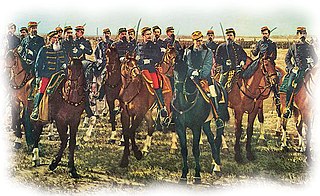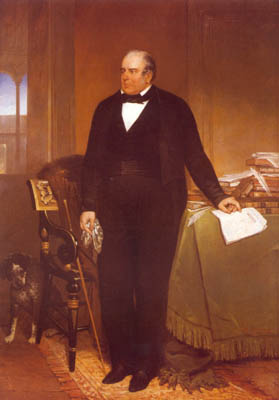
José Manuel Emiliano Balmaceda Fernández served as the 10th President of Chile from September 18, 1886, to August 29, 1891. Balmaceda was part of the Castilian-Basque aristocracy in Chile. While he was president, his political disagreements with the Chilean congress led to the 1891 Chilean Civil War, following which he shot and killed himself.

The Conquest of the Desert was an Argentine military campaign directed mainly by General Julio Argentino Roca during the 1870s and 1880s with the intention of establishing dominance over Patagonia, inhabited primarily by indigenous peoples. The Conquest of the Desert extended Argentine territories into Patagonia and ended Chilean expansion in the region.

The Chilean War of Independence was a military and political event that allowed the emancipation of Chile from the Spanish Monarchy, ending the colonial period and initiating the formation of an independent republic.

Francisco Antonio García Carrasco Díaz was a Spanish soldier and Royal Governor of Chile. His political relations with Juan Martinez de Rozas and a smuggling scandal involving the frigate Scorpion destroyed what little authority he had, and required that he surrender his post to Mateo de Toro Zambrano President of the first government board. He was the last governor to rule before the Chilean independence movement swept the country.

Mateo de Toro Zambrano y Ureta, 1st Count of La Conquista, was a prominent Spanish military and political figure of Criollo descent. He held the position of a knight in the Order of Santiago and was the lord of the Toro-Zambrano estate.

The First Government Junta of Chile, officially the Provisional Government Junta of the Kingdom in the name of Ferdinand VII, was the organization established to rule post-colonial Chile following the deposition and imprisonment of King Ferdinand VII of Spain by Napoleon Bonaparte. It was the earliest step in the Chilean struggle for independence, and the anniversary of its establishment is celebrated as the national day of Chile.

Bishop José Antonio Martínez de Aldunate y Garcés de Marcilla was a Chilean Bishop and member of the First Government Junta of Chile.

Fernando Márquez de la Plata y Orozco was a Spanish colonial functionary, and a member of the First Government Junta of Chile.

José Miguel Infante y Rojas was a Chilean statesman and political figure. He served several times as deputy and minister, and was the force behind the Federalist movement in that country.

The first lady of Chile is the title for the wife of the president of Chile, who is traditionally responsible for directing and coordinating activities in the social field of the presidency and accompanying the president in ceremonies or official activities, for example, on state visits. Although not an official title, it is widely used in formal protocol and has been used in some decrees.
Mateo is a masculine given name, a form of Matthew used in Spanish and Croatian, similar to the Italian form Matteo. Notable people with the name include:

Enrique Víctor Aquiles Balmaceda Toro was a Chilean politician, diplomat and son of President José Manuel Balmaceda. He was of Basque descent and a member of the Balmaceda family.
María Nicolasa de Valdés y de la Carrera, Countess of La Conquista was the inaugural First Lady of Chile from September 18, 1810, when her husband assumed the presidency in Chile's First Government Junta, until her death four months later.
Gregorio José de Toro y Valdés, 2nd Count of La Conquista was a Spanish-Chilean nobleman who commanded Royalist troops during the Chilean War of Independence.
Manuel María de Toro y Dumont, 3rd Count of la Conquista was a Spanish nobleman who fought with the Royalist troops during the Chilean War of Independence.
Zambrano is a surname of Spanish and also Basque origin. Members of this family have played a prominent role through the history of Spain and The Americas.
The following lists events that happened during 1810 in Chile.
The following lists events that happened during 1811 in Chile.
The following lists events that happened during 1818 in Chile.
This page is based on this
Wikipedia article Text is available under the
CC BY-SA 4.0 license; additional terms may apply.
Images, videos and audio are available under their respective licenses.











